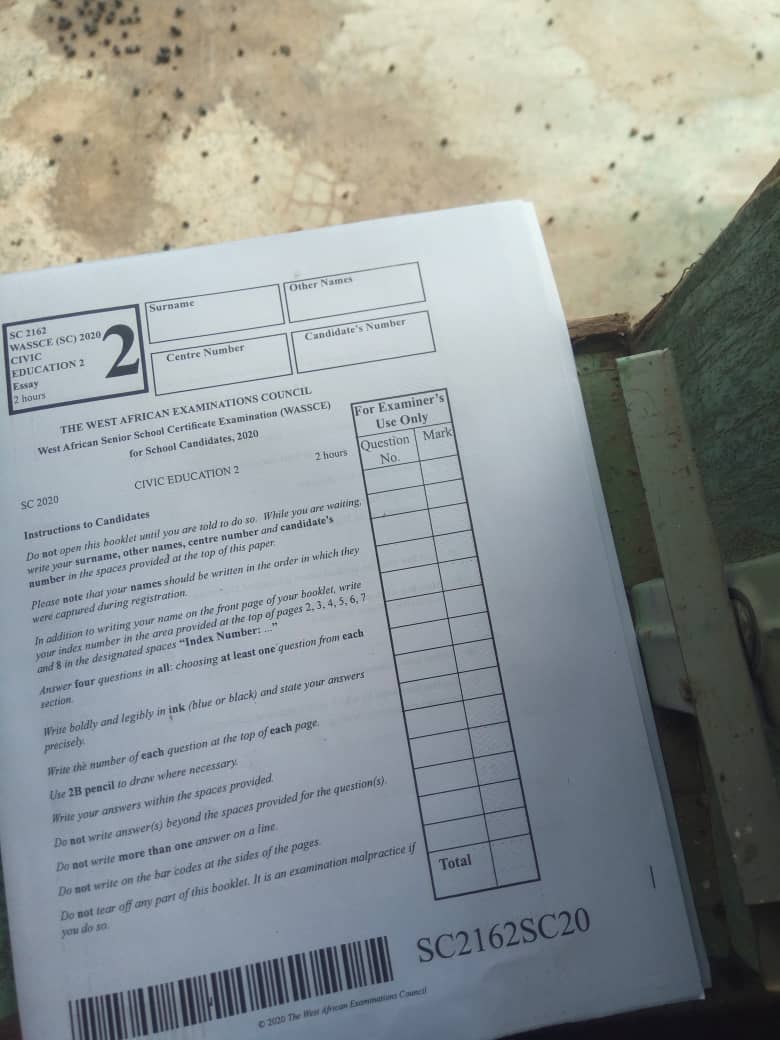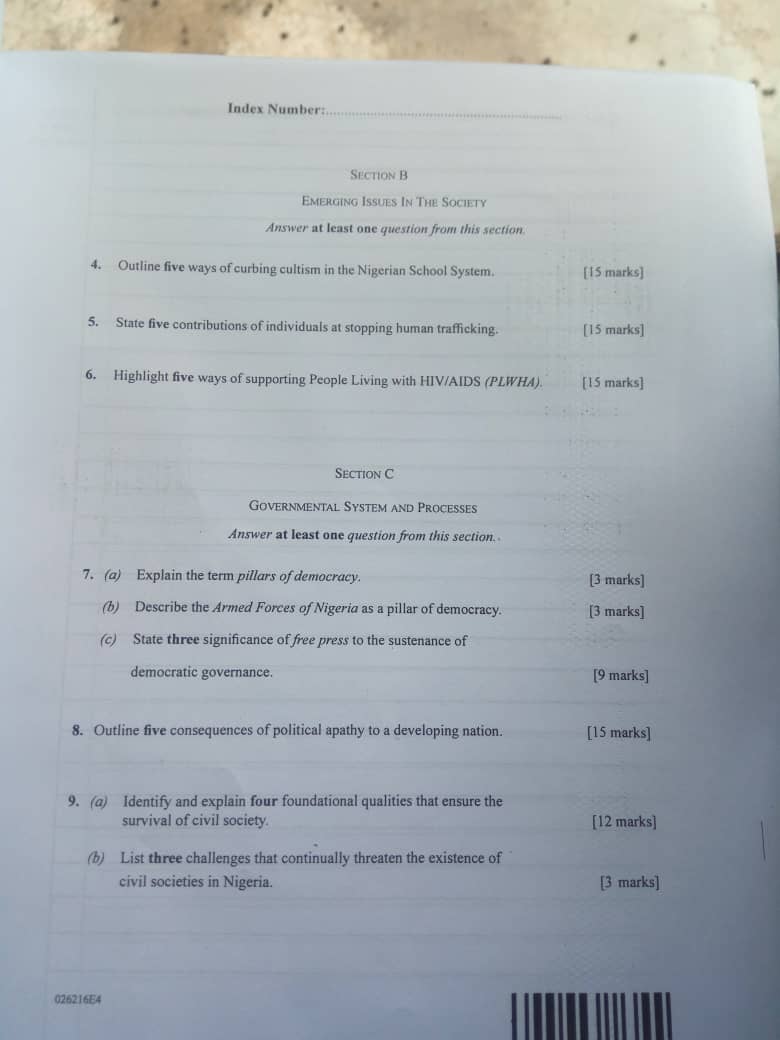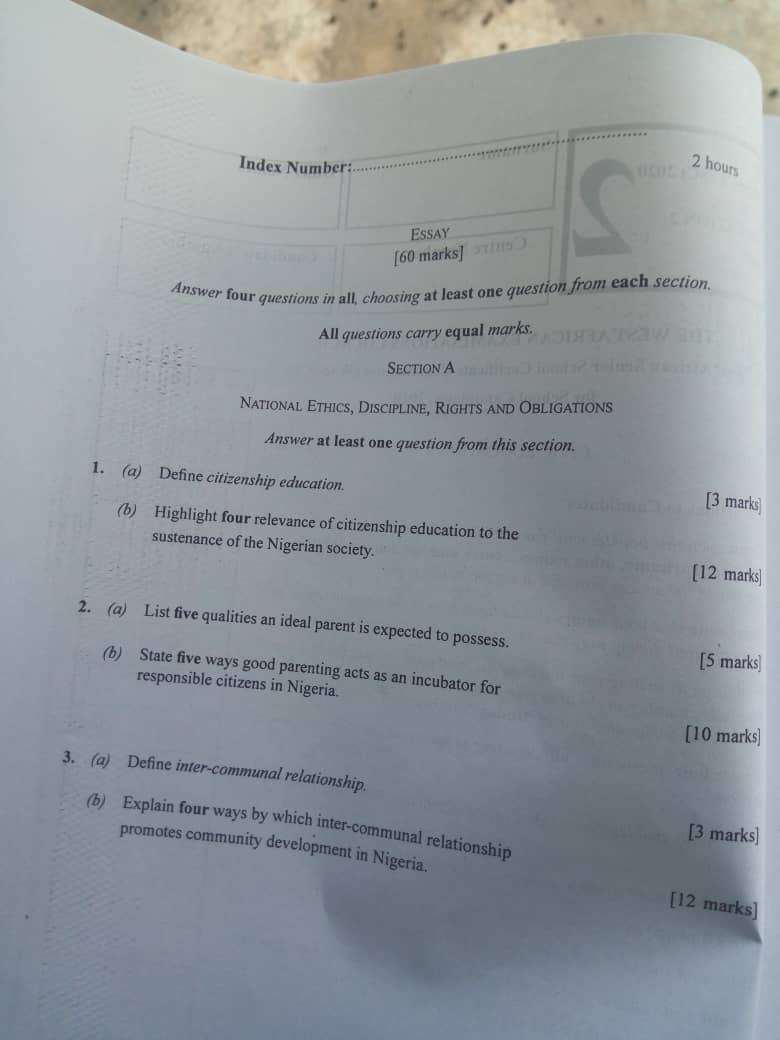WWW.SOLUTIONFANS.COM - MASTER OF ALL EXAM RUNS
WAEC-CIVIC-EDUCATION-ANSWERS
Keep Subscribing With Us To
Enjoy Our Service And Get Your Legit.
Solution Before Exam Time.
=====================================
WAEC-CIVIC-EDUCATION-ANSWERS
Civic-Obj.
1CADCBACDAD
11BACCDACCCC
21CCBBBCCDCB
31ADBCBBBCCD
41ACADDCBDCB
Completed
Www.Solutionfans.Com
Love You All.
====================================
(9a)
(i)Problem solving: Civil society is a dedicated and committed problem-solver, but it seems clear that it needs to step up its efforts to adapt to a new reality of rapidly changing interconnected problems.
(ii)High ambitions and high expectations : The workload of civil society organizations has increased in the past few years, and with more work comes more responsibility and the need to manage expectations.
(iii)Difficult legislative and operational environment Across the globe, the general trend towards more restrictive regulatory measures, increased controls, and funding restrictions by governments is unquestionably making it more challenging for certain civil society institutions to carry out their activities.
(iv)Reworking the relationship with the private sector: Meanwhile, businesses have become more visibly engaged with the social and environmental agenda.
(9b)
(i)Bad limited resources
(ii)Bad leadership
(iii)Bad restricted participation
====================================
(7a)
The pillars of democracy refer to the intellectual foundations that support the philosophy of democracy. With knowledge of the pillars then a person can predict additional features that should be used in a practical application of the theory of democracy. It is even possible to propose new features based on rational extensions as implied by the foundations.
(7b)
The principle of political control of armed forces as we know it today is rooted in the concept of a representative democracy. It refers to the supremacy of civilian institutions, based on popular sovereignty, over the de-fense and security policy-making apparatus, including the military leadership.
(7c)
(i)Freedom from prior restraint on the press or arbitrary punishment for whatever is published.
(ii) The right for everyone with the means to establish press outlets and to jealously protect news sources.
(iii) The principle that any restrictions on press freedom must be applied or subject to review by a competent court and the court alone has the right to impose penalties on unprofessional conduct.
(iv) The prohibition of all forms of government interference on the press in the forms of censorship or similar prior restraint.
====================================
(4)
(i)Counseling in the school and at home
(iiGood teacher/student relationship
(iii)Parents should endeavour to observe and know the person or friends their children moves with
(iv)Visitation of parents to school to be aware about the activities of their children
(v)Good school allows for proper monitoring of students
(vi)The Frear of God is beginning of wisdom; efforts should be made at home , peers and the entire community to inculcate the fear of God into youths
====================================
(5)
(i)Volunteer and support anti-trafficking efforts in your community to eradicate any form of trafficking.
(ii)Organize a fundraiser and donate the proceeds to an anti-trafficking organization will help the stop of trafficking .
(iii)Encourage your local schools or school district to include human trafficking in their curricula and to develop protocols for identifying and reporting a suspected case of human trafficking or responding to a potential victim.
(iv)Use your social media platforms to raise awareness about human trafficking, and in term of exposing them. And check out CNN’s Freedom Project for more stories on the different forms of human trafficking around the world.
(v)Become a mentor to a young person or someone in need. In other words be well-informed. Set up a web alert to receive current human trafficking news. Become familiar with public awareness materials available from the Department of Health and Human Services or the Department of Homeland Security.
=====================================
(6)
(i)showing love, respect and support
(ii)knowing the facts about HIV/AIDS and talking openly about
the disease
(iii)helping to reduce stress and stressful situations
(iv)helping to provide balanced nutritious meals
(v)encouraging them to get treatment if they are sick. Most infections are easily treated and cured, even if a person is HIV positive.
====================================
(8)
(i) Political Apathy threatens Democratic dispensation – When a politician wins an election in a high voter apathy political election, such a winner wins with a minority vote. Such a vote doesn’t give the winner confidence that s/he is a popular political representative in a given area.
(ii) Elections are not representative – Results of elections are supposed to be based on majority feelings. With political apathy, such is difficult.
(iii) Political Apathy hinders good governance and decision making – When elected political leaders win with a minority vote, such leaders feel reluctant to mobilise majority citizens in the area who might not have voted for him or her.
(iv) Political Apathy retards community and national developmental processes. Instead of a political leader to concentrate on spending more time facilitating development related projects, he or she might spend more time justifying that he or she is current ward councilor, member of parliament or a current president.
(v) Another major cause of high voter apathy is that most politicians don’t perform to the expectations of the electorate.
====================================
(1a)
Citizenship education is an education that empower individuals to understand their rights and to be responsible, respectful, and participatory.
(1b)
(i)Allowing Citizens To Contribute For Common Good
(ii)Being Civil Competencies
(iii)Creating Freedom Awareness Among Citizens
(iv)Knowing Of One’s Constitutional Rights
(v)Ensuring Equality Of Citizens
(vi)Understanding The Truth About Citizenship
====================================
(2a)
(i) Positive role Model
(ii) Academic Support
(iii) A Sense of Humour
(iv) Attunement
(v) Moral and spiritual responsibility
(vi) Love
(2b)
(i)Supporting them in their endeavours
(ii)Assigning them to age-appropriate tasks to teach responsibility
(iii)Disciplining them firmly
(iv)Teaching them empathy,compassion’s and other similar values through role play.
(v)Give Them Sound Educational Background and how to practice religion.
====================================
(3a)
Intercommunal relationship is a relationship which exists between two or more communities. They relate to contribute to the peaceful and harmonious development of the society/communities and bring people of the various communities together.
(3b)
(i) Provision of political development:- A good and positive inter communal relationship helps to promote political development of different kinds and ensures that concerned communities participate in issue related to the development of the community.
(ii) Promotion of peace and unity:- A positive inter communal relationship will help to promote peace and unity in the community.
(iii) Enhancement of security:- It ensures stable and standby security consciousness in the community. It will help to remove fear of violence, war or any kind of between communities.
(iv) Promotion of tribal Marriage:- When there is a good relationship between different communities, it becomes easy for communal/tribal marriage to take place. Positive inter-communal relationship will enhance willingness for the communities to give out their sons and daughters to others from another tribe.
(v) Promotion of economic Progress:- A responsible and positive inter-communal relationship will enhance peaceful atmosphere and strategies for each other or each other business like inter marketing strategies etc.



also don't forget to leave a Reply, we would very MUCH appreciate Your Comments On This Post Below. Thanks!

